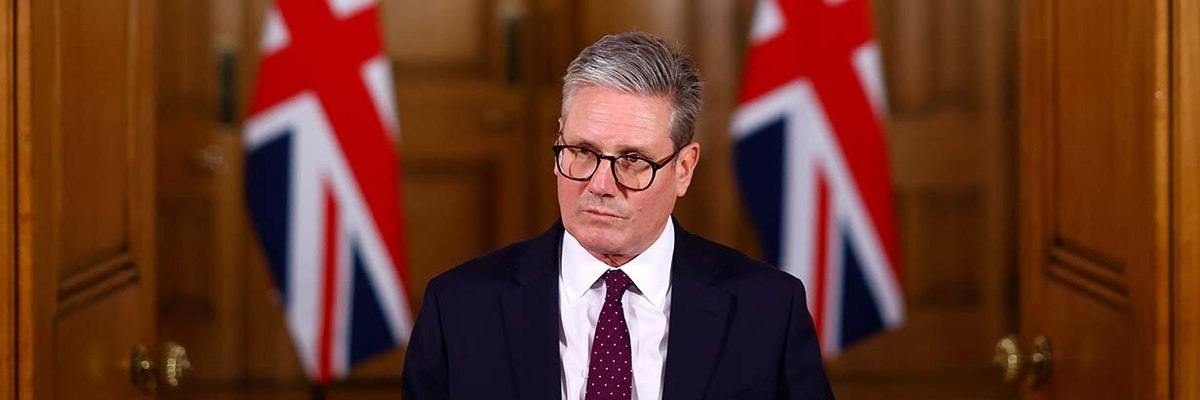Half of Labour voters are disappointed by Starmer’s government, with four in ten Britons feeling the country is in a worse state than before the election
This Sunday, it will have been 100 days since Keir Starmer became prime minister and formed the first Labour government in over 14 years. While still only a fraction of the way through this parliament, it has been an eventful few months and a period that has taken its toll on Labour’s popularity.
After just three months in power, six in ten Britons (59%) disapprove of the government’s record so far, with only one in six approving (18%).
Keir Starmer’s popularity has also sunk, with 63% of Britons seeing him unfavourably and just over a quarter (27%) still holding a positive view of the prime minister, making him as unpopular as Nigel Farage.
Three in ten Britons (30%) say they had expected Labour to do well in government, but have been left disappointed by what they have seen so far, with only one in eight (12%) saying their positive expectations have been met. For a further 37% of Britons Labour’s poor performance is what they were expecting in the first place.
Perhaps most alarmingly for the government, nearly half of those who voted Labour in the election (47%) say they had positive expectations of Starmer’s government but feel let down so far, with only three in ten (30%) feeling Labour has done as well as they had hoped.
Few Britons (9%) believe the country is in a better state for Labour having taken the reins of power, including only a quarter of Labour voters (24%). The public are predominantly split between those who see no real change so far (44%) and those who believe things have become worse (39%).
While this latter view is unsurprisingly most common to Labour’s right, with 70% of Conservatives and 82% of Reform UK voters saying the UK has gotten worse in the last 100 days, one in eight Labour voters (13%) agree.
Britons tend to think Labour have performed badly on every issue...
This perception that Labour are not doing well is true pretty much across the board, with more Britons thinking the government are doing badly than well on every policy area covered by YouGov’s trackers. The only issue that is particularly close is terrorism, where three in ten Britons (31%) see the government as doing well, against 35% who feel they are handling the issue badly.
The areas that the government are most seen to be being handling poorly are immigration, which seven in ten Britons (70%) think Labour is doing badly on, and the NHS, where two-thirds of the public (66%) feel so.
...and most say they have been no better on key issues than the Tories
With the country seen as in a state of disrepair, it might always have been too much to expect Labour to have turned things around so quickly. But Labour will at least want to have at least convinced people that they have been an improvement in office than their Conservative predecessors.
In this, they will be disappointed, with only 8-20% of Britons seeing Labour as an improvement on the previous Conservative government across any of the 15 issues polled – and on only five of these issues is that figure noticeably higher than the number who think the Tories did better than Labour. The most common view across each issue polled (36-54%) is that neither party has outshone the other.
The most notable difference between the current and previous government is on pensions, which one in three Britons (32%) see the Conservatives as having done the better job on, against only 9% who feel it is Labour who have handled the issue better.
Labour’s best relative performance is on the NHS, which one in five Britons (20%) see Labour as having done the better job on, compared to 8% who see the Conservatives’ recent stewardship of the NHS as superior.
What are Labour’s most and least popular actions so far?
Although the new government’s overall record tends to be judged negatively by the public when viewed in general terms, Labour’s specific actions in office get a more varied reception. At the top of the list, 61% are supportive of the government for having agreed new pay deals with striking junior doctors, while clear majorities (56-57%) approve of suspending arms sales to Israel, lifting the ban on building onshore wind farms, and maintaining the two-child cap on certain welfare benefits.
Britons are more evenly divided on scrapping the Rwanda plan (44% approving vs 38% disapproving), the new pay deals with train drivers (42% vs 44%) and the handling of the summer’s riots (40% vs 41%), although among Labour voters themselves these measures are popular, with between two-thirds and three-quarters (65-75%) approving.
Only two of Labour’s major actions in office get a clearly negative reception from the public – the plans to make winter fuel allowances means tested are seen negatively by 55% of people, while two-thirds of Britons (68%) disapprove of the government’s decision to release some prisoners early to avoid prison overcrowding.
It is only on releasing prisoners, though, where more Labour voters disapprove (49%) of the government’s actions than approve (38%). On means testing the winter fuel allowance, Labour voters are the only key political or social group to give the policy a net positive approval rating, with 57% approving of the policy, against 38% who do not.
For now, Britons are willing to give Labour the benefit of the doubt
While the report card for the new government is largely negative, Labour will be able to find a degree of solace in that, at just 100 days, there was limited expectation of the government being able to make major improvements, with many still willing to give them at least the benefit of the doubt.
Before the election, only one in ten Britons (10%) felt a government could make even a fair amount of progress on fixing the state of the UK in the first 100 days, with only 43% feeling such an achievement was possible within a year of the election.
Asked this week, only 28% think it reasonable to expect Labour to have made much progress by now, with 57% considering this an unrealistic expectation. Crucially, this includes 77% of those who backed the party in July, suggesting that the government still has some time to convince their voters that they made the right choice.
Indeed, most Britons are still willing to give the new government at least the benefit of the doubt. Our new poll finds that 17% of Britons say “I have high hopes for the Labour Government, and I am sure they are going to do a good job”, while a further 37% more begrudgingly state “I do not have high hopes for the Labour Government, but I am willing to give them the benefit of the doubt”.
This sentiment remains largely unchanged from an equivalent question we asked during the election campaign, although slightly more do now say “I do not have high hopes for the Labour Government, and I am sure they are going to do a bad job” (39%, up from 33% in mid-June).
See the full results here and here
How do you feel about Starmer’s first 100 days in office, the Labour government in general, and everything else? Have your say, join the YouGov panel, and get paid to share your thoughts. Sign up here.
Photo: Getty







